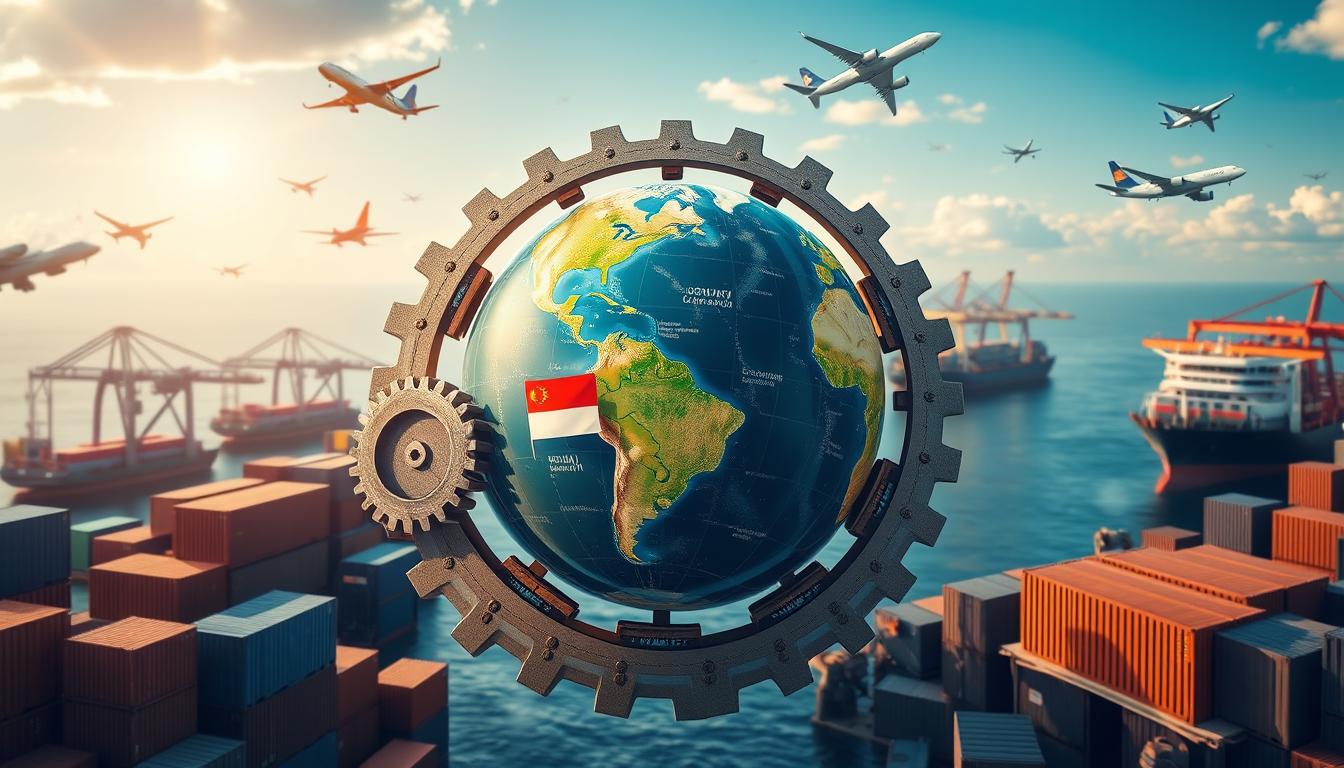The post-trade war era has changed global supply chains a lot. International trade law is key in this new landscape. Companies need to keep up with the latest in international trade law to stay ahead.
International trade law today is complex. Businesses must understand these changes to grow. The global supply chain is changing, and knowing international trade law is crucial for success.
As the global supply chain keeps evolving, companies face new challenges. This article will look at international trade law in the post-trade war era. It aims to give insights and help businesses succeed in this new era.
Understanding the Post-Trade War Landscape
The world of trade has changed a lot lately. Countries have started to put up tariffs and trade barriers. This move towards protectionism has raised trade tensions. It’s crucial for companies to get the hang of this new scene and adjust their plans.
Trade agreements and trade regulations are key in this new world. Businesses need to keep an eye on the latest news to keep their supply chains running smoothly.
Some important things about the post-trade war era include:
- Renegotiation of existing trade agreements to better reflect the current global trade environment
- Implementation of new trade regulations to protect domestic industries and promote fair trade practices
- Increased focus on compliance with existing trade regulations to avoid penalties and reputational damage
As companies move through this new landscape, they must watch how it affects their global supply chains. Trade agreements and trade regulations can touch on everything from where goods come from to how they get to customers. By keeping up with the latest and adjusting their plans, businesses can avoid hiccups and stay ahead in the global market.
The Evolution of Global Supply Chain Management
Global supply chain management has seen big changes lately. This is because cross-border transactions are getting more complex. Companies are using these transactions to grow and work better.
To handle cross-border transactions, businesses need to know a lot about logistics and rules. They must follow customs rules, tax laws, and trade agreements.
Businesses should think about a few things when dealing with cross-border transactions:
- Following all rules and laws
- Using good logistics and supply chain systems
- Finding ways to lower risks in international trade
With technology and knowledge, businesses can make cross-border transactions smoother. This means using digital tools for customs, freight, and other logistics tasks.
International Trade Law in the Post-Trade War Era: New Challenges in Global Supply Chains
As the world of trade keeps changing, companies face tough rules to keep their supply chains running smoothly. WTO rules are key in this area, and businesses need to know the latest to follow the law. With a high chance of international trade disputes, companies must find ways to stay ahead.
To tackle these issues, companies can follow these steps:
- Keep up with the newest WTO rules and laws
- Learn about international trade disputes and how they affect supply chains
- Set up strong compliance programs to lower the risk of disputes
By being proactive in handling international trade law, companies can lower the chance of supply chain problems. This helps them stay competitive globally.
Regulatory Compliance Issues
Following the rules is crucial in the post-trade war era. Companies must know the latest WTO rules and laws to avoid fines.
Cross-Border Transaction Complexities
Dealing with transactions across borders can be tricky and risky. Companies need to grasp these challenges to come up with strategies to stay competitive.
Emerging Tariff Policies and Their Impact
As the world of trade keeps changing, businesses face new challenges. They must deal with tariff policies that affect their supply chains, costs, and how they compete.
Recent Changes in Global Tariff Structures
New changes in global tariffs have raised costs and brought uncertainty. Companies need to keep up with tariff policies changes. They must adjust their plans to stay ahead.
Strategic Responses to Tariff Changes
Companies can tackle tariff changes in several ways. They can spread out their supply chains, renegotiate deals, and use technology to work better. Some effective strategies include:
- Diversifying supply chains to reduce dependence on a single market
- Rethinking production and distribution strategies to minimize tariff impacts
- Investing in technology to improve supply chain visibility and efficiency
By planning carefully and staying informed, businesses can handle the ups and downs of tariff policies. They can keep their edge in the global market.
WTO Rules and Modern Supply Chain Operations
Companies in the global market face a maze of rules and laws, including import-export laws. These rules are key to modern supply chain operations. Businesses must keep up with new rules to avoid supply chain problems.
To follow WTO rules and import-export laws, companies can use experts and technology. They can use automated systems to track shipments. They also need to stay current with trade regulation changes.
Important things for global companies to think about include:
- Keeping up with import-export laws changes and their supply chain impact
- Using systems to track and manage shipments according to WTO rules
- Being informed about trade regulation updates and adjusting supply chains
By being proactive in following rules, companies can avoid fines and damage to their reputation.
Digital Transformation in International Trade
The digital transformation of international trade is changing how companies work and interact. Technology helps businesses be more efficient, cut costs, and improve customer service. Digital transformation in international trade is now essential to stay ahead globally.
As companies start their digital journey, they face complex e-commerce regulations. They must follow digital documentation standards for smooth cross-border deals. Key parts of digital transformation in international trade include:
- Streamlining supply chains through digital platforms
- Implementing blockchain technology for secure and transparent transactions
- Developing e-commerce strategies that comply with regulatory requirements
By embracing digital transformation and keeping up with
Risk Management in Cross-Border Transactions
Companies doing business across borders face many risks. These include legal, regulatory, and reputational risks. To tackle these, it’s key to do a detailed legal risk assessment and come up with good plans to reduce risks. With the right skills and tools, businesses can spot risks early and plan ahead to keep their supply chains running smoothly.
The steps to manage risks in cross-border deals are important. They include:
- Doing deep research on the laws of the countries involved
- Looking at the risks each deal might bring
- Creating plans to lessen these risks
- Putting in place ways to watch and handle risks as they happen
By being proactive in managing risks and doing a solid legal risk assessment, companies can lower their risk exposure. This helps ensure their international trade goes well.
Environmental Regulations and Sustainable Supply Chains
Companies face a complex world of international trade. They must think about how their actions affect the environment. Environmental regulations are getting stricter, thanks to governments and consumers wanting greener practices. By focusing on sustainable supply chains, businesses can cut their environmental impact, boost their image, and stay ahead of the competition.
Some key benefits of sustainable supply chains include:
- Reduced carbon emissions
- Conservation of natural resources
- Improved waste management
Companies can reach these goals by keeping up with environmental regulations and using new technologies and knowledge. This might mean using renewable energy, cutting down on packaging, or finding better ways to move goods.
In summary, sustainable supply chains are essential today. By focusing on environmental regulations and green practices, businesses can help create a better future for everyone.
Dispute Resolution in International Trade
Companies face many challenges in global trade, including disputes. It’s important to resolve these disputes quickly and efficiently. Modern arbitration mechanisms are now a key part of this process, offering a faster and cheaper way than traditional lawsuits.
Staying updated on dispute resolution in international trade is crucial. This helps companies avoid financial losses and damage to their reputation. By using technology and expertise, businesses can create strong strategies for resolving disputes.
- Understanding the different types of dispute resolution methods, including arbitration, mediation, and negotiation
- Developing a comprehensive dispute resolution plan that takes into account the company’s specific needs and risks
- Staying up-to-date with the latest developments in modern arbitration mechanisms and alternative dispute resolution methods
By being proactive in dispute resolution, companies can reduce the risk of conflicts. This ensures they are ready to handle any disputes that come up.
Modern Arbitration Mechanisms
Modern arbitration offers many advantages, like being faster, cheaper, and more flexible. These systems can be customized for each company’s needs. They can solve a variety of disputes, from contract issues to intellectual property problems.
Future Trends in Trade Regulations
The world of global trade is always changing. Future trends in trade regulations will shape the industry. It’s crucial for companies to keep up with the latest news and trends.
Watch for the rise of digital trade, the push for sustainability, and changes in international institutions. Businesses can use their knowledge and technology to stay ahead. This helps keep their supply chains running smoothly and keeps them competitive.
Key factors to consider in future trends in trade regulations include:
- Digital trade agreements and their impact on global commerce
- Sustainability initiatives and their role in shaping trade policies
- The evolving role of international institutions in regulating global trade
By staying informed and understanding future trends in trade regulations, companies can thrive in a complex world.
Conclusion: Navigating the New Era of Global Trade
As the world changes, companies must keep up with global trade. They can succeed by facing challenges and seizing opportunities. It’s important to stay updated on international trade laws and use the latest technology.
Businesses should also plan well to handle risks and make the most of new trends. This way, they can grow and succeed in the global market.
The future of global trade will be both complex and full of chances. Companies can make their supply chains strong by following rules, making transactions easier, and being green. By being quick, creative, and focused on sustainable growth, they can do well for a long time.

